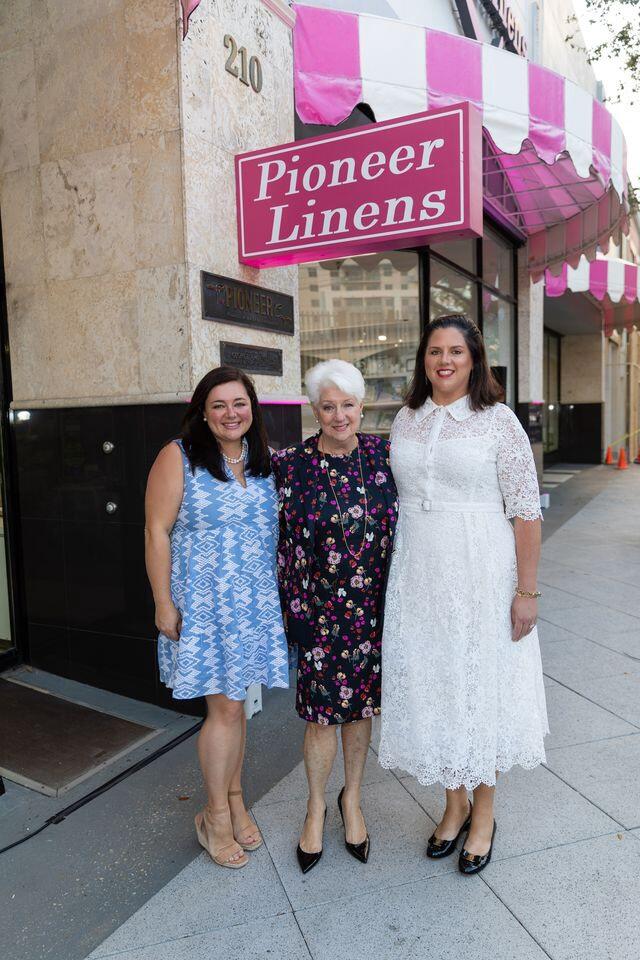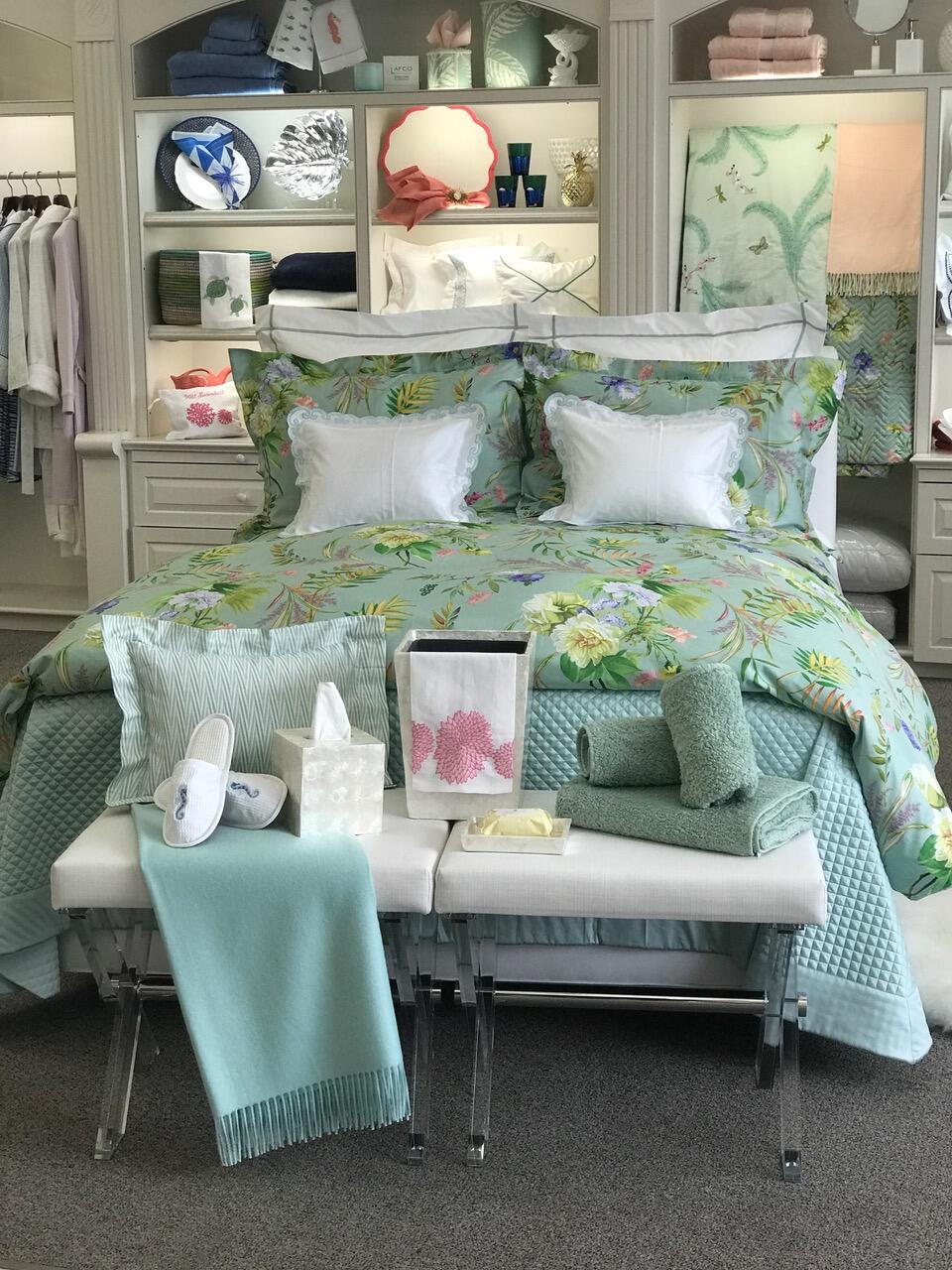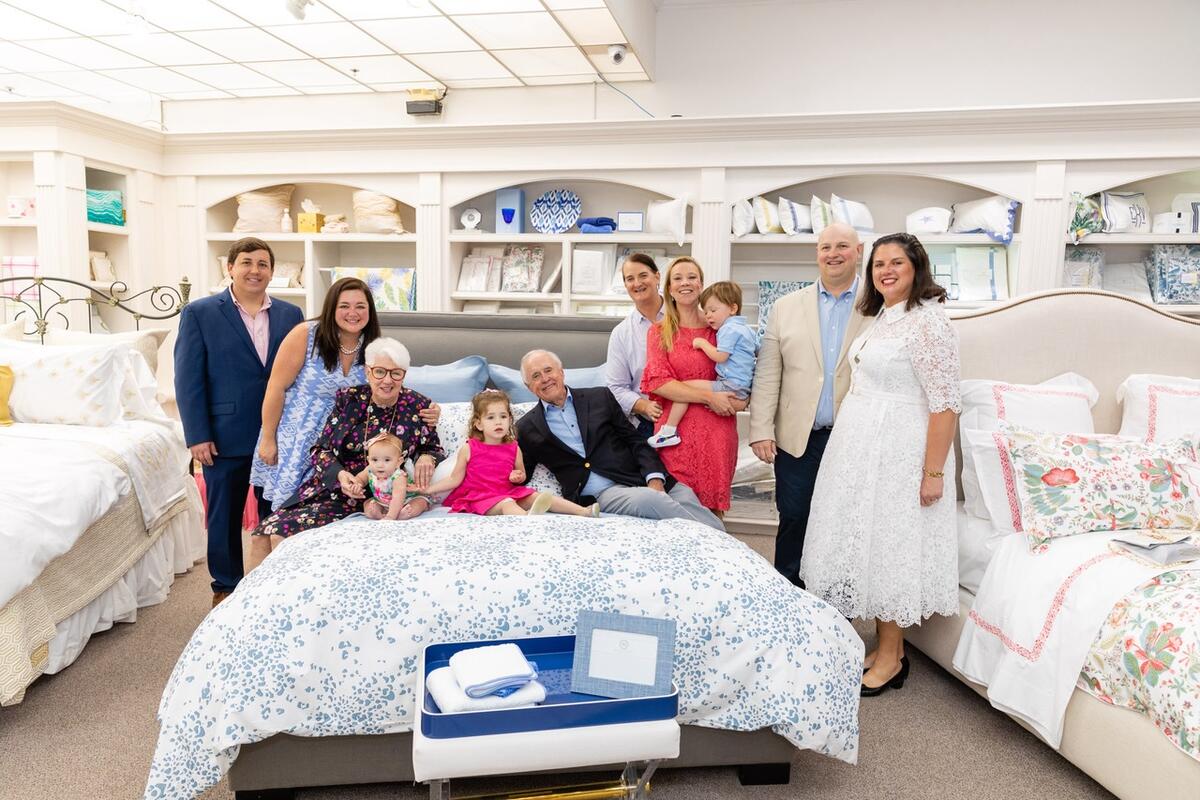In Business of Home’s series Shop Talk, we chat with owners of home furnishings stores across the country to hear about their hard-won lessons and challenges, big and small. This week, we spoke with Penny Murphy, the owner and president of Pioneer Linens in West Palm Beach.
The 112-year-old business is entwined in the history of southern Florida. Initially named Pioneer Hardware, it sold the nascent state’s new residents the supplies they needed to settle the land, including tents, fishing equipment and dynamite to clear their plots. From its Lake Worth shop, the brand expanded to add furniture and decor for all those new homes, then contracted its inventory to survive the century’s hurricanes, depressions and world wars.

Murphy is the third-generation owner of the business, having joined Pioneer in 1994 at age 50. Continuing the family tradition of responding to their changing demographic and pivoting with the times, she brought the company’s sales online and thus global, shipping luxury linens around the world from a plum base on West Palm’s famed Clematis Street. Under her leadership, Murphy’s children have contributed as well: Her daughter Camille serves as buyer and merchandising manager; her daughter Marissa oversees digital efforts; and her son, Alan, created dedicated linens for yachts.
According to Murphy, the secrets of the storied company’s success boil down to the basics: treating staff well, nurturing deep relationships with vendors and customers alike, paying bills on time, and shrinking overhead to weather any (literal) storms.
What was your childhood like growing up around the business? I have this romantic idea of you running through the aisles.
Well, I probably did run through the aisles. The store’s pretty large for linens—between 7,000 to 8,000 square feet. My grandfather [Max Greenberg] was the one who started the business; he came over here [from Austria] in 1912 and they were giving land away in South Florida at that time. People were building their homes and living in tents, and there was nothing here. He started the business as a hardware store, and as the town and South Florida evolved, we’ve been able to change with it.
As a child, I would go into the store and up to the office to see my dad or see my grandfather. We didn’t work there as kids. [My father] separated that. I have one memory when my mom decided she wanted to get us out of the house, so my dad took my brother and me to work. I remember folding towels all day long, then he gave us a quarter. That was the best!
Tell me about your (first) career path.
[Before I started] working at Pioneer, right around my 50th birthday, I had a career as a schoolteacher. I got a master’s in early childhood [education] and I worked in the Palm Beach County school system for a while, and then I stayed home and raised my children. I was involved in their schools, did some substitute teaching, and started a little private kindergarten here in West Palm Beach for a while—that was my first foray as an entrepreneur.
What made you join the store when you did?
The kids were in middle school at that time. A friend was working at a school and asked me if I would come work in the office with her. I did a lot of fundraising and marketing [in that role], and the fact that we were really successful with that caught my father’s attention. He said, “Maybe you could do some of this for us!” He was trying to attract the designer trade at that time. So I left the school and joined Pioneer. That was 1994.

What are some of the changes you’ve made, or some of the ways that the business pivoted since you joined?
Mattress manufacturers in the 1990s decided that they were going to change 7- or 8-inch mattresses to make 15-to-20-inch mattresses. We have an affluent clientele, [and] they went out and bought these great mattresses, then got them home and realized their sheets with a 7-inch pocket were not going to go over that 20-inch corner. They came in like, “They didn’t tell us we’d need custom sheets!” Maybe a year or two later, manufacturers started making the larger size and went into luxury—the first one was Frette. Then Sferra one-upped with a thread count that felt like silk. Sheets became more of a fashion statement, and people became educated as to what a really fine sheet should feel like.
[People also] started building McMansions with those gigantic bedrooms and large bathrooms with great big tubs, so then we did beautiful embroidered towels and linens. Then bathroom accessories changed, from plastic trash cans to pretty colored enamel. We listen to what people want, we read the trade magazines, and we work with a lot of fashion-forward designers. We go to the trade shows, we see what’s happening, and we learn.
How would you describe the store’s aesthetic? How is the space arranged?
We have about 10 beds on the floor arranged in different looks, with different kinds of materials, so people come in and they see lots of colors. Palm Beach likes to entertain, so we want enough inventory that they can walk out with whatever they need. That’s another thing that separates us from a lot of linen stores: a very large inventory. One of the things my father [George Greenberg] instilled in me was that Palm Beach is seasonal, so when they come in, they need it. They don't want to order something. On a New Year’s Eve maybe 10 years ago, this lady called me at 12:30 p.m. to say that she was having a party and had set the table for X number of people. A friend called and said, “May I bring another person?” And she was going to completely redo her whole table to accommodate this one guest. She came in and bought chargers, napkins, napkin rings—everything to make that table look really nice.
There were people from New York who came to live here during the pandemic, and they would call and say they’ve got company coming and they need 10 pillows. We’d have those 10 pillows in stock for them.
Do you have a lot of trade customers? What is the balance of designers versus folks off the street?
I would say maybe 25 percent are designers. We have designers from all over the country that we’ve met at showhouses, or someone has referred them to us, or they’ve flown in here because they have a client in Palm Beach.
The company has a long history. Can you tell me about some of the tougher times over the years, and how you dealt with them?
In 1918, the flu virus [hit and] was really bad. In 1928, there was a horrible hurricane that absolutely took out his hardware business, and he moved [just north] up to West Palm Beach to the building that we’re in now. The next year was the crash of 1929. There are stories that my grandparents sold a whole bunch of records and other household things to keep the business going. There were the two world wars, and lots of recessions over the years. As a good businessperson, you have to get lean and know how to cut the inventory, while focusing on the things that are most important to you.

Why do you think Pioneer has been able to last? Is it those pivots?
My father passed away in 2007. In 2008, we had that downturn, and also the Madoff scandal here—Palm Beach was ground zero for that, so it hit a lot of our customers. Again, we went down to a skeleton crew. We have people who have worked for us for a very long time, and we try to treat everybody really well. Our core values are [based around] our staff. Because we’ve been in this community for so many years, our business is generational. People go, “Oh, I knew your dad!” My children’s friends shop with us now. We are able to accommodate people, and we bend over backward when they need something, and they tell their friends. It’s the relationships we’ve been able to build—with our customers, staff, manufacturers—because we’ve been with them for such a long time and we pay our bills on time. That goes a long way.
What has it been like to watch how Palm Beach has changed over the course of your lifetime?
When I was growing up, there was a pretty big divide between Palm Beach and West Palm Beach, but since the pandemic, it’s pretty much blended. The price of houses over there have skyrocketed, and much to my chagrin, they’ve torn down the beautiful old Spanish [buildings] that make Palm Beach a really unique town. They’re building these gigantic new houses. We have some of the wealthiest people in the nation moving down here—rock stars, fashion designers. A lot of the big financial businesses that moved out of New York are here, so they’re calling this “The Wall Street of the South.” That’s changing our skyline, as they’re putting up gigantic buildings. It’s really good for our business. I liked it when we were a small community, but it certainly has been great to get new customers.
Your children have joined the business. Were you always hoping they would, and what’s it like to work with your kids?
My son started working with us when I joined the business. He developed our linens-for-yachts business and got that off the ground. My daughters graduated school during the downturn, and it wasn’t intended at all for them to be part of this business, but they fell into it because they needed jobs. One of my daughters had a degree in advertising and communications, so she helped get our advertising in magazines. My other daughter worked with our website—I’m the one who started the website for Pioneer Linens when I got here—and does that and our social media. Nothing was planned, but it just worked out. With any family business, some days are better than others. As sisters, sometimes they’re as close as two peas in a pod, and sometimes they’re not. But we have a lot of fun. We get to travel together. We love having our family together, especially now that the grandbabies are here.
What’s your favorite day as a shop owner?
I’ve got several. When somebody really interesting comes in, that’s fun. Sometimes we have a windfall day: Someone will come in with a very large house and a lot of merchandise goes out and our cash register goes ka-ching! Another favorite day is when people come in that we haven’t seen for a long time, and we get to visit and it’s like a party. My favorite part of our business is the relationships and interesting people.
And you never know! I can give you a quick [example of how the life of a business owner holds all kinds of surprises]: This gentleman with a skin care line came in, and we wound up working with him, and I went to the White House with my daughter and her kids because he had connections with the Bidens and got us to the [Easter] egg roll. It was incredible! I mean, it’s [all about spending time with] beautiful items and incredible people.





























